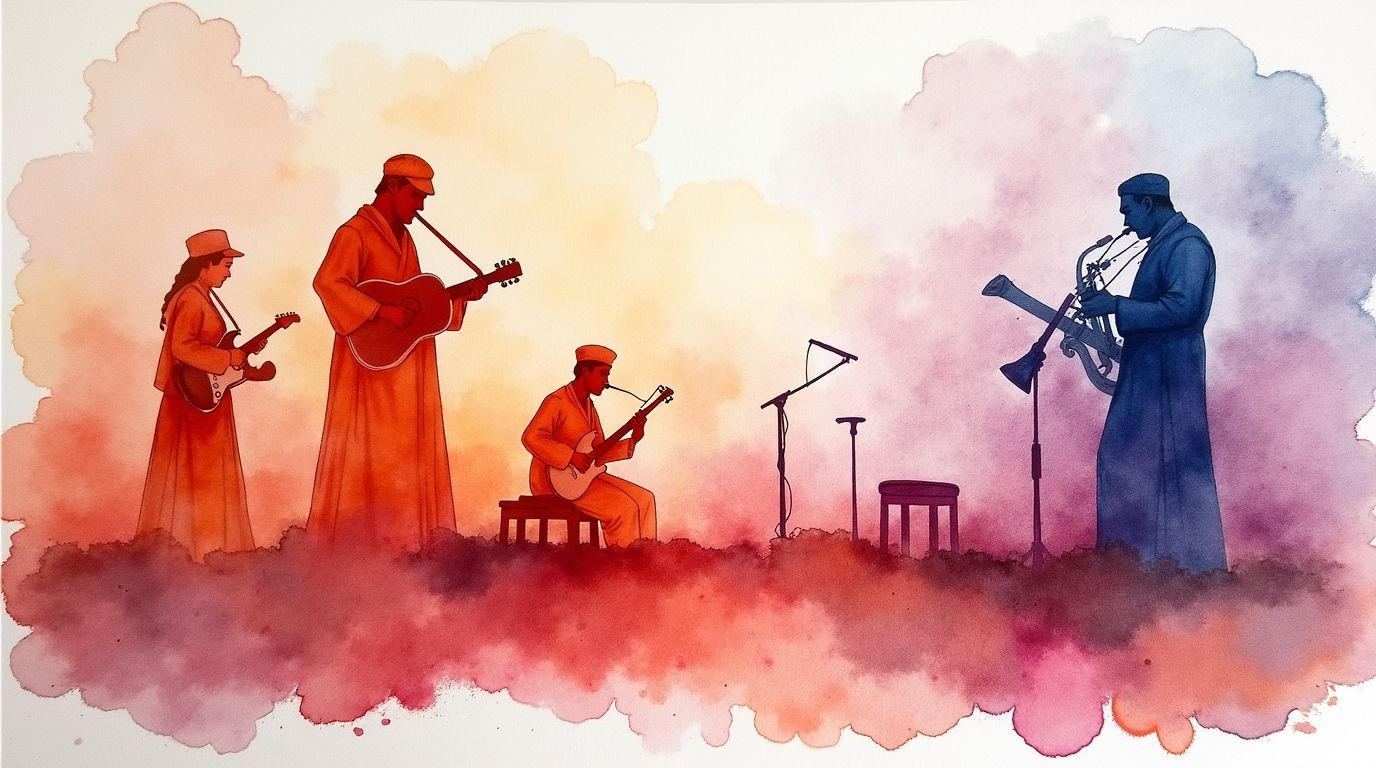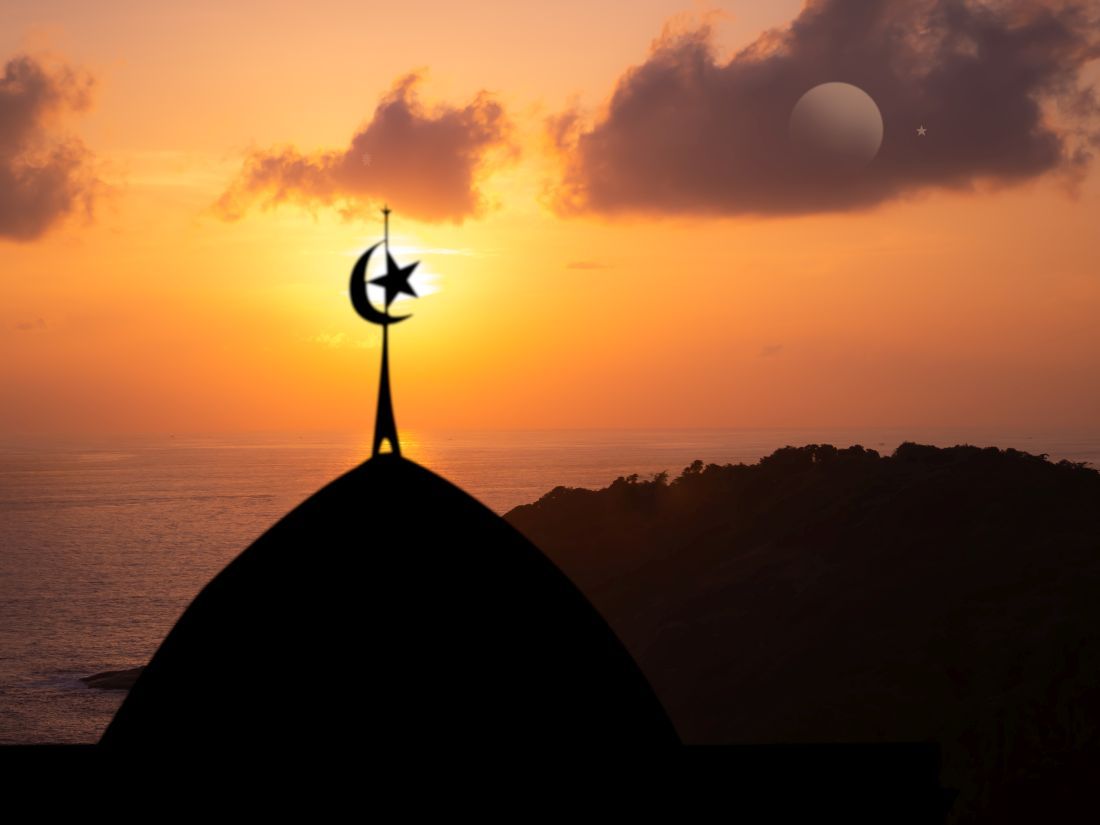Get in touch
555-555-5555
mymail@mailservice.com
The Mystics and Secrets of Fasting in Ramadan: A Spiritual Exploration through the Teachings of Al-Ghazali
bas meijers • December 5, 2024
About the secrets of fasting

The Mystics and Secrets of Fasting in Ramadan: A Spiritual Exploration through the Teachings of Al-Ghazali
Fasting during Ramadan, a central pillar of Islam, is more than a physical act of abstaining from food and drink; it is an opportunity for spiritual transformation and enlightenment. For the mystics of Islam, particularly through the teachings of the great scholar and theologian Abu Hamid al-Ghazali, fasting is not just a discipline but a gateway to inner purity and a profound connection with the Divine. Al-Ghazali’s writings, which delve deeply into the soul’s purification, offer timeless wisdom for those who seek a deeper understanding of the secrets of fasting.
The Role of Fasting in Spiritual Ascension
Al-Ghazali, in his monumental work "Ihya' Ulum al-Din" (The Revival of the Religious Sciences), explores fasting as a means of achieving spiritual clarity and closeness to God. He emphasizes that the essence of fasting goes far beyond the outward act of refraining from food and drink. The true purpose is to cleanse the soul and in matter to purify the heart. In this sense, fasting becomes an exercise not only in self-discipline but also in heightened awareness of God's presence.
In his book "Kitab al-Sawm" (The Book of Fasting), Al-Ghazali writes:
"The essence of fasting is not merely to refrain from food and drink; rather, it is to abstain from sinful speech, harmful actions, and distractions that take us away from the remembrance of God." (Ihya' Ulum al-Din, Book of Fasting)
Al-Ghazali teaches that fasting is a means to master the lower self (nafs), which is constantly drawn toward material indulgence. Through the restraint of physical desires, the believer ascends to a higher state of consciousness, one where the soul becomes attuned to spiritual truths. This practice purges the inner self of arrogance, selfishness, and heedlessness, replacing these traits with humility, gratitude, and awareness of divine mercy.
The Mystical Dimensions of Fasting
For the Islamic mystics, or Sufis, fasting has an even deeper, more esoteric dimension. It is not only a method of self-control but also a form of spiritual intimacy with the Divine. The Sufi understanding of fasting transcends the bodily experience and becomes a vehicle for divine love. Al-Ghazali, in his works, frequently refers to the significance of “spiritual fasting,” which involves not only abstaining from food but also from negative emotions and thoughts.
A well-known Sufi saying encapsulates this deeper meaning of fasting:
"Fasting is not just for the stomach, but for the eyes, the ears, the tongue, the hands, and the feet."
This quote points to the Sufi concept of "fasting of the limbs"—the idea that true fasting involves the restraint of all senses from the distractions and indulgences of the material world.
The Sufi mystic Rumi, one of the most revered figures in Islamic spirituality, echoes this in his poetry:
"You were born with wings, why prefer to crawl through life?"
The essence of Ramadan, from a mystical perspective, is to transcend the ego and awaken to the soul’s higher purpose. The act of fasting is seen as a tool that unites the seeker with the divine, purifying their heart to experience the hidden secrets of existence. It is a means of drawing closer to Allah’s "Fana" (annihilation of the self) and "Baqa" (eternal existence in God).
The Secret of the Heart’s Fast
Al-Ghazali highlights that fasting is also a means of purifying the heart—a central concept in Islamic mysticism. The heart, in this sense, is more than a physical organ; it is the seat of spiritual consciousness. Fasting helps remove the impurities that accumulate over time, such as pride, envy, and greed, and instead cultivates virtues such as compassion, sincerity, and love for God.
He writes:
"The fast of the heart is far more important than the fast of the body. The fast of the heart is abstention from all desires that lead one away from God." (Ihya' Ulum al-Din)
In this context, fasting becomes an act of spiritual detoxification. Just as the body requires physical cleansing, so too does the heart require spiritual cleansing to draw closer to the Divine. For Al-Ghazali, the ultimate goal of fasting is not merely to avoid food or drink but to achieve a higher state of consciousness, where the heart is fully aligned with the will of Allah. This alignment brings forth an inner peace and clarity, which can only be found in the complete surrender to God’s presence.
Fasting as a Means of Divine Love
For the mystic, fasting in Ramadan is also an act of divine love. As the Qur’an states:
"O you who have believed, decreed upon you is fasting as it was decreed upon those before you that you may become righteous." (Qur'an 2:183)
Al-Ghazali elaborates on the connection between fasting and the purification of the soul by describing how fasting creates a space for the believer to experience God’s love more deeply. In his view, the very act of fasting draws one closer to the Divine, and fasting becomes a direct expression of devotion and love for God.
"When you fast, you draw closer to Allah, who will pour His mercy upon you. The fasting person who refrains from their desires in obedience to God will be granted a place in Paradise that no one else can reach." (Ihya' Ulum al-Din)
This mystical understanding of fasting as a form of divine love resonates with the teachings of many early Islamic scholars and Sufis. Ibn al-Qayyim, another great scholar, wrote:
"Fasting is a love affair between the servant and the Creator; a secret shared between them."
The experience of hunger and thirst during fasting allows the heart to yearn for the One who sustains and nourishes the soul, deepening the bond between the servant and the Creator. The process of enduring hardship in obedience to God mirrors the mystic’s journey toward ultimate union with the Divine.
The Hidden Blessings of Ramadan
Al-Ghazali also speaks of the hidden blessings and rewards of Ramadan, which are often unseen by the outward eye. He asserts that the month of Ramadan is a time when divine mercy is abundant, and the gates of heaven are open. The sincere fasting believer, even in their moments of physical discomfort, is enveloped in spiritual grace.
"Ramadan is the month of purification, when the sins of the believer are forgiven, and their heart is healed. It is the month in which the soul attains true peace." (Ihya' Ulum al-Din)
This idea of hidden blessings is echoed by the words of the great Islamic mystic Junayd of Baghdad, who said:
"The fasting person sees things with a clarity that others do not, for their heart is free from the distractions of the worldly life."
For Al-Ghazali and the Sufi tradition, Ramadan is a precious time for spiritual awakening. It is a month where the believer can unlock the secrets of fasting through introspection, prayer, and seeking closeness to God. The discipline of fasting is both a physical and spiritual purification, one that elevates the soul and leads to a deeper understanding of the Divine.
Conclusion: The Eternal Secret of Fasting
Through the wisdom of Al-Ghazali and the teachings of the Sufi mystics, we are reminded that the true secret of fasting is not merely in abstaining from food and drink but in surrendering the self to God. It is a journey of purification, spiritual awakening, and divine love. As Ramadan approaches, we are given a unique opportunity to experience this spiritual fast, allowing us to transform our hearts, align our wills with the Divine, and draw closer to the eternal Source of all mercy.
In the words of the great mystic Al-Junayd:
"The fast of the heart is to be with God, free from all distractions, free from the world."
Let us, during this blessed month, embrace the true essence of fasting—not just as a ritual but as a deep spiritual practice that purifies the heart and soul, drawing us closer to our Creator.
Ibrahim aka Bas Meijers
Share
Tweet
Share
Mail
Reflections on Converting

By bas meijers
•
April 2, 2025
There was a time when jazz filled my days—when a well-placed horn solo or a smoky bass line felt like a conversation between soul and sky. It wasn’t just music. It was movement, emotion, prayer without words. But somewhere along the path, I let it go. As I became more serious about my faith, I started questioning everything I consumed. Like many Muslims navigating their journey, I came across debates around music: is it haram? Is it a distraction? Does it serve the ego more than the soul? These questions echoed loud enough to drown out my jazz collection. Slowly, I stopped listening—not out of conviction, but out of uncertainty. But silence has its own way of inviting reflection. And in that quiet space, I began to wonder: Was I really abandoning something harmful… or something sacred? That question led me down a path I hadn’t expected—a deep dive into the history of jazz, and more specifically, the legacy of Muslim jazz musicians. What I found was both humbling and inspiring. This post is a tribute to those artists. To the ones who found God in rhythm, who made space for both saxophones and sujood, who turned improvisation into a kind of worship. It’s also an invitation—to look again at what we consider spiritual, and to remember that the soul doesn’t always speak in words. Sometimes, it swings. The Historical Connection: Islam & Jazz in the 20th Century To understand why so many jazz musicians embraced Islam, you have to step into the rhythm of the 1940s and beyond—when segregation still choked the streets of America, and Black artists were carving out space for identity, dignity, and soul. For many, jazz was already more than music. It was resistance. It was expression when the world tried to silence you. But something else was happening beneath the surface—a spiritual hunger. Amidst the chaos of racial injustice and the shallowness of fame, Islam offered something deeper: discipline, brotherhood, and a direct line to God. The Nation of Islam and the Ahmadiyya movement were especially influential during that time. These weren’t just fringe ideas—they were lifelines for Black men and women who had been denied their humanity by dominant Western systems. Islam gave them new names, new purpose, and a language of peace that matched the purity they longed to hear in their music. Artists like Art Blakey, Yusef Lateef, and Ahmad Jamal weren’t just converting—they were transforming. Their spirituality didn’t compete with their music; it sharpened it. You could hear it in the way they played—intentional, contemplative, soulful. In many ways, jazz and Islam were a perfect match. Both rely on improvisation within structure. Both ask you to listen closely. Both demand sincerity. In a time when the world treated Black identity like noise, Islam and jazz together became a symphony of self-respect. Art Blakey (Abdullah Ibn Buhaina): The Beat Behind the Belief When Art Blakey sat behind a drum kit, it wasn’t just about rhythm—it was about revelation. Every hit, every roll, every explosive solo felt like a heartbeat echoing with purpose. He wasn’t just playing jazz. He was preaching through it. Born in 1919 in Pittsburgh, Blakey came up in the golden era of jazz, and by the 1940s, he was already a force. But in 1947, a trip to West Africa changed everything. While touring with the legendary Billy Eckstine Band, Blakey spent time in Nigeria and Ghana, and it was there that he embraced Islam—taking the name : Abdullah Ibn Buhaina. Blakey didn’t talk much about the details of his conversion, but those close to him said Islam brought him a kind of grounding he hadn’t known before. In a world where Black artists were often exploited, Islam gave him dignity. In an industry known for chaos, it gave him order. And yet, Blakey didn’t separate his faith from his music. He poured it into his work—especially through his legendary group, The Jazz Messengers. That band wasn’t just a showcase of talent; it was a training ground, a spiritual school for generations of musicians who would go on to change jazz forever. Under Blakey’s leadership, The Jazz Messengers became a sanctuary of sorts. He held his players to high standards—not just musically, but ethically. Many say he was like an elder, guiding younger musicians not just through chord changes, but through life. Blakey himself once said : Music washes away the dust of everyday life. And for him, that dust included racism, injustice, spiritual restlessness—the grime of a world that too often forgot God. His drumming was thunderous, but it came from a place of calm. A place of faith. So when we talk about jazz as a spiritual path, we have to start with Art Blakey. Not just because he was a genius behind the drums, but because he showed us what it looks like when rhythm becomes remembrance—when belief lives in the beat. Yusef Lateef: The Seeker of Sound and Spirit If Art Blakey brought Islam to the drum kit, Yusef Lateef brought it to the cosmos. Born William Emanuel Huddleston in Chattanooga, Tennessee in 1920, Lateef was already a gifted musician by his teens. But it was in 1948 that he embraced Islam and took the name that would become iconic in both jazz and spiritual circles: Yusef Lateef. What set Lateef apart wasn’t just his skill—though he was a master of the tenor sax, flute, oboe, bassoon, and more—it was his relentless curiosity. He didn’t see jazz as a fixed form. To him, it was a vessel. A way to explore culture, history, and the divine. Lateef was one of the first jazz musicians to openly and intentionally incorporate non-Western instruments and scales into his music. He drew from Middle Eastern maqams, Asian folk traditions, African rhythms, and—crucially—Islamic spiritual concepts. His 1957 album "Prayer to the East" wasn’t just a title—it was a statement. A sonic turning toward Mecca. He saw music as an extension of adab’—Islamic etiquette, refinement, and inner discipline. He once said: My music is about reaching people with sound that comes from a pure place. Music should heal, not harm. That intention bled into every note he played. His compositions weren’t about impressing people with technical skill; they were about affecting the heart. In that way, his jazz felt more like dhikr—a remembrance of the Divine. Yusef Lateef taught us that Islam doesn’t limit creativity—it expands it. That jazz doesn’t have to be secular to be sacred. And that sometimes, the holiest sound is not a spoken prayer, but a flute played with sincerity. Ahmad Jamal: The Sound of Stillness In a world that often equates greatness with volume, Ahmad Jamal taught us that less can be more sacred. Born Frederick Russell Jones in Pittsburgh in 1930, Jamal converted to Islam in the early 1950s and took the name Ahmad Jamal. Like Blakey and Lateef, his journey into Islam wasn’t just a name change—it was a lifestyle, a philosophy, a code of presence and purpose that deeply shaped his music. Jamal’s playing was quiet, intentional, and precise—almost minimalist. But don’t let that fool you. Beneath the space and silence was a *force*. Miles Davis once said Jamal was one of his biggest influences, and if you listen close, you’ll hear it: the way Jamal played with time, with tension, with breath—it was like listening to someone meditate through melody. His album “Ahmad Jamal at the Pershing: But Not for Me” became a huge success in 1958, but Jamal never chased fame. Instead, he focused on integrity—refusing to let ego hijack his art. He was known for running a tight band, for avoiding the club scene drama, and for living a life rooted in spiritual discipline. Jamal once said in an interview: The philosophy of Islam has been so beautiful to me. It’s a religion of peace. It’s a religion of cleanliness. It’s a religion of tolerance. That calm strength? You can feel it in every recording. In many ways, Jamal’s music was a reminder that faith doesn’t always shout. Sometimes, it whispers with elegance. To be continued :

By bas meijers
•
March 28, 2025
Lost in Finding Religion: A Journey Beyond Borders For those who seek truth, the path can feel like a paradox. We search for spiritual enlightenment, only to find ourselves enclosed within walls built by the very teachings that once opened our hearts. Each religion, with its beauty and wisdom, also seems to hold an unspoken rule: that the light you have found must remain within its shell, never to be shared beyond its borders. I have walked this journey myself. I was raised without a certain faith. It shaped my childhood, gave no rhythm to my days, weeks, months or years, and offered me a hollow, empty sense of belonging. Finding Islam, the familiar call to prayer, the rituals of Ramadan, the sacred stories passed from generation to generation—these are all part of my current foundation that holds me. And yet, as I grew older, a quiet restlessness stirrs within me. My heart begins to lean toward broader horizon, to ask questions that do not have easy answers. I ain't looking to leave anything behind; I am simply seeking more. When I red about the Bahá'í Faith, it wasn’t in a moment of rejection—it was in a moment of expansion. The teachings of unity, the oneness of humanity, and especially the concept of "progressive revelation" opened a new dimension of understanding for me. The idea that all prophets—Muhammad, Jesus, Moses, Buddha, Krishna, Bahá'u'lláh—brought the same divine light in forms that suited their time... it made sense. It wasn’t in conflict with what I knew from the Qur’an—it added to it, deepened it. Not a new religion for me, but a broader lens through which to appreciate the wisdom I already held. Still, I didn’t want to abandon Islam. So I did not. The daily rhythm of Salat, I am supposed too, keeps me focussed and awake, the five prayers, anchors me. They bring me back to myself, and to God. They are not just rituals—they are a kind of homecoming. In those moments of silence, of surrender, I find clarity. And when I open the Qur’an, I find reminders that reinforce my path: “Indeed, this Qur’an guides to that which is most upright and gives good tidings to the believers who do righteous deeds that they will have a great reward.” — Surah Al-Isra (17:9) And another verse that always speaks to my soul when I start to feel pulled in too many directions: “And do not be like those who forgot Allah, so He made them forget themselves. Those are the defiantly disobedient.” — Surah Al-Hashr (59:19) In Sufi thought, I found a bridge—a way to explore deeply without losing my roots. Ibn Arabi wrote: "Do not attach yourself to any particular creed exclusively... The object of your search should be the Truth itself, and not any particular embodiment of it." That line gave me permission to learn from many places while staying devoted to my own. But Sufism doesn’t only encourage openness—it also emphasizes the depth of one’s own well. Rumi, another master of the inward path, once said: "You were born with wings. Why prefer to crawl through life?" And yet, he also reminded: "The way of the Sufi is the way of devotion. You must stay in one place long enough for the truth to enter you." That speaks to me now more than ever. Because the truth is—religions, in their earthly forms, can sometimes discourage followers from looking beyond. They can become protective, fearful of influence, concerned with boundaries. But the soul is not built for confinement. It is built for longing, and for flight. Even so, I’ve learned that while openness is essential, so is rootedness. You can explore other mountains, but you need one to climb. You can taste many waters, but you need one well to draw from daily. Spiritual growth takes time. It takes return. There is a beauty in continuity. Just as a tree grows deeper roots by remaining planted, so too do we, by sticking with the path that grounds us. You can open your windows to the world, but you still need a home to return to. So perhaps the real challenge is balance. To stay faithful, without becoming closed. To stay open, without becoming scattered. To allow the light from many traditions to illuminate your path, while walking it with both feet planted in your own. The Light Beyond the Walls I built my house in the garden of prayer, Five times a day, I returned there. The wind would knock, carrying songs From temples, churches, foreign tongues. I listened—not to betray my roof, But to know if all flames came from one truth. A voice said: “Drink where the river runs, But do not forget where your well begun.” I met the traveler with many names, He spoke of Prophets as one flame. I saw no war in his reflection, Only mirrors of divine connection. Yet still, I missed the scent of my dawn— The call to prayer, the peace of Qur’an. For though I’d tasted other skies, It was this moon that steadied my eyes. Ibn Arabi whispered through silence deep: Don’t marry form; seek what it keeps. But Rumi touched my heart more still: Stand in your love. Let the world refill. O seeker—yes, roam, but don’t uproot. Let your branches stretch, but guard your root. The Truth is vast, but so is the Way That brought you here, that taught you to pray. One lamp may light a thousand more, But it must remain on the prayer room floor. Dance with the stars, wander the sea— But return to the ground where you learned to be.

By bas meijers
•
March 8, 2025
The Intellectual and Historical Foundations of Imam al-Nawawi’s Riyadh al-Salihin Imam Yahya ibn Sharaf al-Nawawi (1233–1277 CE) was a towering figure in Islamic scholarship whose contributions to hadith, jurisprudence, and spirituality remain influential. This post explores the intellectual background of al-Nawawi prior to his compilation of Riyadh al-Salihin, tracing his formative years, scholarly influences, and the socio-religious climate that motivated him to produce this seminal work. By examining his methodology and objectives, this study elucidates how Riyadh al-Salihin was conceived as a response to ethical and spiritual challenges in the Muslim community of his time. Introduction The study of hadith literature and its role in shaping Islamic ethical and moral philosophy has long been a cornerstone of Islamic intellectual history. Among the scholars who significantly contributed to this field is Imam al-Nawawi, whose work Riyadh al-Salihin (The Gardens of the Righteous) is one of the most widely studied hadith collections. To understand the motivations and intellectual trajectory that led to its compilation, it is crucial to examine al-Nawawi’s formative years, his scholarly environment, and the prevailing social and religious circumstances of 13th-century Syria. Al-Nawawi’s Early Life and Educational Development Born in the town of Nawa in the region of southern Syria, al-Nawawi exhibited an extraordinary inclination toward knowledge from an early age. At approximately 18 years old, he moved to Damascus, a leading center of Islamic learning, where he enrolled in Madrasa al-Rawahiyya. Under the tutelage of some of the most distinguished scholars of the time, he immersed himself in an intensive study of the Islamic sciences, particularly hadith, fiqh (jurisprudence), and Arabic linguistics. Al-Nawawi’s scholarly methodology was characterized by rigorous study habits and asceticism. Historical reports suggest that he would study up to 12 lessons daily, covering multiple disciplines. His engagement with both textual sources and oral transmission of knowledge cemented his reputation as a polymath deeply rooted in the classical traditions of Islamic legal and ethical thought. The Socio-Religious Context of 13th-Century Syria The period in which al-Nawawi lived was marked by political instability and moral decay in certain segments of the Muslim society. The Mongol invasions had left parts of the Islamic world in disarray, while within the Mamluk-controlled regions, scholars were grappling with the challenge of preserving religious knowledge and moral conduct amidst political turbulence. Al-Nawawi was particularly concerned with the decline of personal piety and ethical consciousness among Muslims. His writings often emphasize the necessity of reviving core Islamic values, such as sincerity (ikhlas), patience (sabr), and humility (tawadhu ), as mechanisms for spiritual and communal renewal. The Intellectual Motivation Behind Riyadh al-Salihin Al-Nawawi’s decision to compile Riyadh al-Salihin was driven by a desire to produce an accessible yet comprehensive guide to ethical and spiritual development. Unlike other hadith collections primarily focused on jurisprudential rulings (ahkam), Riyadh al-Salihin centers on the refinement of character (tazkiyat al-nafs). The collection is systematically arranged into thematic chapters covering virtues such as sincerity, patience, gratitude, and benevolence, with hadith selected to offer practical moral guidance. His methodological approach in compiling this work reveals an intent to bridge the gap between theoretical knowledge and applied ethics. By selecting hadiths that emphasize moral conduct and personal discipline, al-Nawawi sought to create a text that was not only scholarly but also practical for the general Muslim population. The arrangement of hadiths follows a pedagogical structure designed to cultivate a gradual internalization of Islamic virtues. Part one in a nutshell The intellectual and social forces that shaped al-Nawawi’s scholarly pursuits culminated in the compilation of Riyadh al-Salihin as a response to both the ethical shortcomings and spiritual needs of the Muslim community of his time. His work remains an enduring testament to the interplay between hadith scholarship and ethical philosophy, serving as a cornerstone for Islamic moral instruction across generations. Understanding al-Nawawi’s motivations provides deeper insight into how classical Islamic scholarship was not merely a theoretical pursuit but a lived engagement with the moral and social realities of the time. References - Al-Nawawi, Yahya ibn Sharaf. Riyadh al-Salihin. - Makdisi, George. The Rise of Colleges: Institutions of Learning in Islam and the West. - Ibn Hajar al-Asqalani. Al-Durar al-Kamina.

By Bas Ibrahim Meijers
•
February 28, 2025
🌙 Ramadan Mubarak! 🌙
The crescent moon has been sighted, marking the beginning of the holy month of Ramadan tomorrow! A time for reflection, prayer, and self-discipline, Ramadan brings an opportunity to purify the heart, strengthen faith, and spread kindness.
May this month be filled with blessings, peace, and spiritual growth for all. Let’s embrace this sacred time with gratitude, patience, and compassion. Wishing everyone a beautiful and fulfilling Ramadan!
#RamadanMubarak #RamadanKareem #Blessings #Faith #Fasting #Prayer #CrescentMoon #Peace #SpiritualJourney

By bas meijers
•
February 24, 2025
1. Laylat al-Qadr: The Night of Power The main reason the last ten nights are special is because of Laylat al-Qadr (The Night of Power), which is hidden within them. Allah mentions this night in the Quran: Laylat al-Qadr is better than a thousand months ( Al-Qadr, 97:3*) This means that worship on this one night is more valuable than worship done for over 83 years! Since the exact night is unknown, Muslims increase their devotion in the last ten nights to make sure they don’t miss it. 2. The Prophet’s ﷺ Practice The Prophet Muhammad ﷺ himself emphasized the importance of these nights: - He increased his worship in the last ten nights more than at any other time of the year. - He performed I‘tikaf (spiritual retreat) every year in these nights. - He said: "Seek Laylat al-Qadr in the odd nights of the last ten nights of Ramadan."(Bukhari & Muslim) Since Laylat al-Qadr could fall on any of the odd nights (21st, 23rd, 25th, 27th, or 29th), Muslims dedicate all ten nights to worship to ensure they catch it. 3. The Spiritual Benefits of the Last Ten Nights - A chance for complete forgiveness – The Prophet ﷺ said: > "Whoever stands (in prayer) on Laylat al-Qadr with faith and seeking reward, his past sins will be forgiven." (Bukhari & Muslim) -A time when dua is most accepted – The Prophet ﷺ recommended making this dua frequently: > O Allah, You are the Most Forgiving, and You love to forgive, so forgive me." (Tirmidhi) - The final opportunity to maximize Ramadan’s blessings – Since Ramadan is ending, this is the last chance to seek rewards before it is gone for another year. Conclusion The idea of the last ten nights being the most powerful comes from the Quran and the teachings of the Prophet ﷺ, not from later scholars or traditions. The mystery of Laylat al-Qadr encourages believers to engage in intensive worship, making these nights the most spiritually significant time of the year.

By bas meijers
•
February 23, 2025
One of the most profound teachings I have come across is from Imam Al-Ghazali’s " Ihya’ Ulum al-Din" (The Revival of Religious Sciences), where he beautifully explains the deeper purpose of fasting beyond just abstaining from food and drink. As it trulyu is my first ramadan as a muslim, i wished to inform myself, and the deeper you go the bigger it becomes in beauty. It gave already so much strength to stay on this path The Three Levels of Fasting Al-Ghazali categorizes fasting into three levels, emphasizing that its true essence lies in spiritual purification: 1. The Basic Fast (`Sawm al-Umum`) – The common level, where one refrains from eating, drinking, and sexual relations during the day. 2. The Special Fast (`Sawm al-Khusus`) – A higher level, where one also controls their tongue, eyes, ears, and thoughts, avoiding gossip, backbiting, and distractions. 3. The Fast of the Elite (`Sawm Khusus al-Khusus`) – The deepest form, where even the heart is free from worldly concerns, focusing entirely on God and spiritual connection. As I go through my first Ramadan, I aspire to move beyond just the physical fast and truly embrace the inner dimensions of self-discipline and mindfulness. The Wisdom Behind Fasting According to Al-Ghazali, fasting is not just a ritual but a training for the soul. Some of its key purposes include: - Breaking the hold of the ego (`nafs`) – by denying constant indulgence in food and comfort, we learn self-control. - Developing patience (`sabr`) – fasting strengthens our willpower, teaching endurance in all aspects of life. - Feeling empathy for the poor – experiencing hunger allows us to appreciate the struggles of those less fortunate and increases generosity. - Strengthening sincerity (`ikhlas`) – unlike other acts of worship, fasting is hidden; only Allah knows if we are truly fasting, making it a deeply personal form of devotion. Laylat al-Qadr: Seeking the Night of Power Another key moment that Al-Ghazali emphasizes is "Laylat al-Qadr" , the night of great spiritual significance in the last ten nights of Ramadan. It is a time to: - Seek forgiveness and make heartfelt du’a. - Engage in deep worship, reciting the Quran and praying long into the night. - Detach from worldly distractions and focus on spiritual elevation. The Importance of Community One of the things that has made my first Ramadan special is the sense of brotherhood and sisterhood at the mosque. Al-Ghazali also highlights the role of good company in spiritual growth, and sharing iftar with others truly strengthens that bond. A Journey Beyond Hunger As I continue this journey, I realize that fasting is not just about feeling hunger but about gaining closeness to Allah, purifying the heart, and developing gratitude. I hope to implement Al-Ghazali’s teachings by striving for a meaningful fast that goes beyond the physical and touches the soul. Yet i got intriqued by those ten last nights.......why have those nights such spiritual strength and be prayed in during the night by many Muslims.....lets find out.....see you in Pt 2

By bas meijers
•
February 23, 2025
Before embracing Islam, I saw surrender as something negative, a forced resignation. But through my journey, I realized that surrendering to Allah is not about giving up—it’s about gaining clarity, certainty, and inner peace. In this post, I’ll explore how Islam redefines surrender, how it harmonizes with free will, and how embracing this concept transformed my life. The Western View of Surrender vs. the Islamic Perspective Growing up, I was taught that success comes from taking control of my life, setting my own rules, and never backing down. In Western philosophy, surrender often implies defeat. Think of Nietzsche’s idea of the “will to power” or the modern self-help movement that tells us to “manifest” our desires. The underlying message is clear: control equals power. But Islam presents a different perspective. True power doesn’t come from controlling everything—it comes from recognizing our limits and trusting in the One who has ultimate control. Surrender in Islam (Islam itself means “submission”) isn’t about passivity; it’s about actively choosing to trust Allah’s wisdom over our limited understanding. The Qur’an repeatedly invites us to reflect on this concept: “… And whoever relies upon Allah – then He is sufficient for him…” (Qur’an 65:3) Surrender in this sense isn’t a weakness—it’s the key to real strength. Free Will and Divine Decree – A Paradox? One of the biggest questions I had before reverting was: If God has already written my fate, do I really have free will? It seemed contradictory. But Islam provides a nuanced understanding of this balance between divine decree (Qadr) and human choice. Imagine you’re traveling on a road. You can choose different paths, but the mapmaker already knows where each one leads. That’s how I came to understand Qadr. We make choices, but Allah’s knowledge is infinite. That doesn’t mean our choices are meaningless—it just means they exist within a framework only He fully understands. Through this, I realized that surrendering to Allah doesn’t mean giving up control—it means making the best choices I can while trusting that He has already accounted for everything. This perspective shifted the way I approached life’s uncertainties. Personal Reflections – How Surrendering Transformed My Life When I first accepted Islam, surrender didn’t come easy. I had spent years shaping my own path, believing that my success or failure was entirely in my hands. But life doesn’t always go as planned, and the more I tried to control everything, the more anxious and restless I became. The moment I truly let go and placed my trust in Allah, everything changed. It wasn’t that my problems disappeared—it was that my heart found peace despite them. I stopped overthinking every decision, fearing the unknown, and dwelling on regrets. I found comfort in knowing that whatever happens, as long as I do my part, Allah’s plan is always better than mine. At first, this shift felt unnatural. I had been conditioned to believe that success meant never letting go of control. But as I started to surrender to Allah’s wisdom, I realized that real success isn’t about controlling outcomes—it’s about aligning my efforts with faith and letting go of anxiety about the results. One of the biggest struggles I faced was patience. Trusting Allah’s plan meant accepting that things wouldn’t always unfold on my timeline. There were moments of doubt, times when I wanted immediate answers, and days when I questioned whether I was strong enough to let go. But through prayer, reflection, and the support of fellow Muslims, I slowly learned to embrace patience as part of surrender. Now, surrendering to Allah shapes every aspect of my life. When faced with difficult decisions, I don’t panic or obsess over every detail—I do my best and leave the rest to Him. When challenges arise, I remind myself that hardship is temporary and always carries wisdom. And most importantly, I’ve learned that true peace doesn’t come from controlling life, but from trusting the One who already has everything under control. I used to think surrender meant losing myself. Now, I see it as the path to truly finding myself. The Ultimate Intellectual Submission – Embracing Islam with Reason One misconception is that Islam requires blind faith. But in reality, the Qur’an constantly encourages us to think, question, and reflect. “Indeed, in the creation of the heavens and the earth and the alternation of the night and the day are signs for those of understanding.” (Qur’an 3:190) Many reverts, including myself, didn’t come to Islam emotionally—we came through intellectual curiosity. We studied, asked difficult questions, and sought answers. And the deeper I looked, the clearer the truth became. Surrender in Islam isn’t abandoning reason; it’s acknowledging that reason alone has its limits. Just like we trust a doctor when we’re sick, trusting Allah means recognizing that He sees the full picture when we don’t. The Journey of Unlearning – Shedding Old Beliefs to Embrace True Surrender Reverting to Islam isn’t just about learning new principles—it’s about unlearning so much of what we once believed to be true. Before Islam, my worldview was shaped by a culture that valued personal ambition above all else, that told me happiness was mine to create, and that surrendering meant weakness. Letting go of these ingrained beliefs wasn’t easy. The most difficult part of unlearning was my pride. I had spent a lifetime believing that I was the master of my destiny. It took time to accept that while I had free will, ultimate control belonged to Allah. Surrendering meant breaking the illusion of self-sufficiency and trusting in something greater than myself. At first, there was resistance—doubt crept in. Had I really been wrong all these years? Was it truly possible that peace could be found in giving up control? But as I slowly let go, I found that surrendering wasn’t about losing freedom—it was about gaining it. No longer enslaved by the anxiety of controlling everything, I found peace in trusting that Allah’s plan was already in motion. Now, I see the world differently. I no longer measure success by material achievements but by my connection with my Creator. My confidence doesn’t come from societal validation but from the certainty that Allah is guiding me. Unlearning was difficult, but what I gained in return—a sense of purpose, peace, and certainty—was worth far more than anything I left behind. True Strength Lies in Submission Surrendering to Allah doesn’t mean losing yourself—it means freeing yourself from the illusion of control. It means finding peace in His plan rather than exhausting yourself trying to control the uncontrollable. As a revert, I’ve learned that true strength isn’t in fighting fate but in trusting the One who knows best. And in that trust, I’ve found something I never had before: certainty. If you’re struggling with the concept of surrender, I encourage you to reflect. Is it really control that brings peace, or is it trust? The answer might just change everything.

By bas meijers
•
February 22, 2025
The Nature of Suffering Seneca's quote, "We suffer more often in imagination than in reality," encourages reflection on the nature of human suffering. This idea can be further explored through the following perspectives: Psychological Aspect: Seneca highlights how our thoughts can amplify fears and anxieties. Cognitive Behavioral Therapy (CBT), a modern psychological approach, echoes this sentiment by suggesting that altering negative thought patterns can lead to improved emotional well-being. Islamic View on Suffering: In Islam, suffering is often seen as a test from Allah. The Quran states, “Do not lose hope, nor be sad” (Quran 3:139), reminding believers that trials are a part of life. The concept of patience (Sabr) is emphasized, encouraging individuals to endure hardships with faith. The Role of Preparation and Opportunity Seneca's assertion that "Luck is what happens when preparation meets opportunity" underscores the importance of diligence: Practical Application: This quote can inspire individuals to take proactive steps in their lives, whether in education, career, or personal development. Setting clear goals and working towards them aligns with both Stoic and Islamic values. Islamic Teachings on Effort: The Quran encourages striving for success through hard work. The Prophet Muhammad (peace be upon him) stated, “The seeker of knowledge is in the path of Allah.” This illustrates that effort in pursuit of knowledge and growth is highly regarded in Islam. The Concept of Wealth and Contentment Seneca’s quote, "It is not the man who has too little, but the man who craves more, that is poor," invites a deeper examination of materialism: Philosophical Reflection: This perspective challenges societal norms that equate wealth with happiness. It encourages a shift towards valuing experiences and relationships over material possessions. slamic Perspective on Wealth: Islam teaches that true wealth lies in contentment. The Prophet Muhammad (peace be upon him) emphasized this through his teachings, stating that a rich person is one who is satisfied with what they have. The focus on gratitude (Shukr) helps cultivate a sense of abundance, regardless of material circumstances. Historical Context of Islamic Scholars The contributions of scholars like Ibn Qayyim Al-Jawziyya and Al-Ghazali provide rich insights into the relationship between heart, mind, and spirituality: Ibn Qayyim Al-Jawziyya: His works often explore the inner dimensions of faith and the importance of connecting with Allah. He believed that the heart is the essence of human experience and that true happiness stems from this connection. Al-Ghazali: Known for his synthesis of philosophy and Islamic theology, Al-Ghazali emphasized the importance of self-reflection and the pursuit of knowledge. He advocated for a balanced life where material pursuits are harmonized with spiritual growth. The interplay between Seneca’s Stoic philosophy and Islamic teachings offers a profound understanding of how to navigate life's challenges. Both traditions encourage self-awareness, resilience, and a focus on what truly matters—inner peace and connection with the divine. By integrating these timeless teachings, individuals can cultivate a more meaningful and fulfilling life, enriched by the wisdom of both worlds. Seneca's Views on Death and Islamic Teachings Seneca on DeathSeneca had a rather unique perspective on death, viewing it not with fear, but as a natural part of life. He famously stated, “Death is not to be feared, but to be understood.” This reflects his Stoic belief that understanding the inevitability of death can lead to a more fulfilling life. He argued that by contemplating death, we can appreciate the present moment and live with intention. In his letter to Lucilius, Seneca remarked, “It is not that we have a short time to live, but that we waste a lot of it.” This encourages individuals to reflect on how they spend their time, urging them to seize the day (Carpe Diem).Islamic Teachings on DeathIslam shares a similar perspective, viewing death as a transition rather than an end. The Quran teaches that every soul will taste death, and it is a part of Allah's divine plan. The Prophet Muhammad (peace be upon him) reminded his followers that life is a temporary abode, and death is merely a passage to the Hereafter. He said, “Remember often the destroyer of pleasures,” referring to death, which serves as a reminder to prioritize what truly matters in life.While contemplating death may seem somber, both Seneca and Islamic teachings encourage a positive outlook. They advocate for living a life of purpose and virtue, understanding that our time is limited.A Light-Hearted Take on DeathNow, let’s add a sprinkle of humor! After all, laughter can be a great way to cope with the heavier subjects in life. Imagine Seneca and the Prophet Muhammad sitting together, sharing a light moment. Seneca might say, “You know, I used to fear death until I realized it was just like a bad haircut—unavoidable and often regrettable, but not the end of the world!” To which the Prophet might chuckle and respond, “Just remember, it’s not about how you leave the world, but how you live in it! And let’s aim for a stylish exit!”This humorous exchange reminds us that while death is a serious topic, it can be approached with a sense of lightness. Both traditions encourage us to live fully, find joy in the present, and maintain a sense of humor about life’s inevitable moments.ConclusionIn both Seneca’s Stoic philosophy and Islamic teachings, the contemplation of death serves as a powerful motivator to live meaningfully. By understanding death as a natural part of life, we can embrace our time on Earth with purpose and joy. And as we navigate this journey, a good laugh here and there can remind us not to take ourselves too seriously—after all, life is a precious gift worth celebrating!

By bas meijers
•
February 21, 2025
"In the Eyes of the Forgotten" I remember the ones who turned away, The friends who left, the strangers who stayed, The parents who couldn’t see my pain, The doors that closed, time and again. The mentors who doubted what I could be, The bullies who mocked and belittled me. The siblings who laughed, the friends who fled, The ones who left me alone in my dread. I was pushed aside, left in the dark, Hiding my wounds, my silent mark. Denied the love I so desperately sought, While they ignored me, lost in their thought. No one looked, no one came near, While I stood waiting, drowning in fear. But through it all, I found only you, In the quiet corners, where none else knew. I saw you, though the world did not see, Through the pain, through the silence, through all of me. I am one of you, you are one of me, Together, we rise—together we’re free. In silence, I bled, in solitude I cried, In my heart, the hope never died. Struggling with my own insecurities, Fighting against my own miseries. Longing for a place where I could be, Yet the world never took notice of me. It passed me by, too busy to care, Leaving me broken, caught in despair. But now I stand, no longer small, No longer the one who stumbled and fell. For I am the one who’s learned to see, Beyond the pain, beyond what was meant to be. I am the solution, not the cause, I’ve healed my wounds, I’ve dropped my flaws. They told me, “There’s no place for you here,” And I asked, “Then where do I go, my dear?” But silence was their only reply, And still, I reached for the sky. I am the forgotten, yes, that’s true, But now I rise, with a strength so new. From this moment, I will not hide, I will no longer stand on the sidelines, denied. I am the Ummah, in faith, I stand, A part of something much greater, hand in hand. The world may not have seen me before, But now, I knock and open the door. For the Prophet spoke of those who fight, Not with swords, but with hearts full of light. The most beloved to Allah, they say, Are those who guide others along the way. I am not broken, I am whole, I am the one who has found my soul. So let them remember, let them see, I am the one who has come to be. I am the Ummah, strong and true, I belong, and I know you do too.

By bas meijers
•
February 15, 2025
In this heartfelt and deeply personal blog post, I open up about the struggles of being a new Muslim in a society that often misunderstands or rejects my faith. While Islam has brought me immense spiritual growth, I also face the pain of discrimination, loneliness, and even distance from loved ones. Through reflection on my journey and powerful Qur’anic verses, I share the silent battle between faith and external pressures—seeking not validation, but understanding. May this piece resonate with those who struggle in silence and serve as a reminder that with hardship comes ease.
**Post Description:**
In this heartfelt and deeply personal blog post, I open up about the struggles of being a new Muslim in a society that often misunderstands or rejects my faith. While Islam has brought me immense spiritual growth, I also face the pain of discrimination, loneliness, and even distance from loved ones. Through reflection on my journey and powerful Qur’anic verses, I share the silent battle between faith and exte


